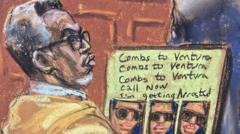As the prosecution rests in the high-profile trial against Sean Combs, the evidence presented raises questions about the strength of the defense's case amidst accusations of abuse and trafficking.
Diddy's Defense Faces Hurdles as Prosecution Wraps Up Case

Diddy's Defense Faces Hurdles as Prosecution Wraps Up Case
Examining the complexities of the trial against Sean "Diddy" Combs
Prosecutors in a federal trial have wrapped up their case against Sean "Diddy" Combs, who faces serious charges of racketeering and sex trafficking. The music mogul, 55, is accused of leveraging his influence to facilitate the exploitation of women while admitting to instances of domestic violence. Despite his not-guilty plea, the prosecution has leaned on testimony from over 30 witnesses, including Combs's ex-girlfriend, musician Casandra Ventura, to build their case.
Ventura provided emotional testimony about her tumultuous relationship with Combs, describing how he coerced her into sexual encounters with male escorts while he watched and recorded. Her account, combined with surveillance footage showing Combs's alleged abuse, has formed a linchpin in the prosecution's argument.
The prosecution's case for sex trafficking has been bolstered by testimony from other individuals in Combs's life, including hotel security staff. Yet, the prosecution faced setbacks, such as the withdrawal of a third alleged victim, raising concerns about the strength of the evidence presented to jurors.
In parallel with sex trafficking, Combs faces racketeering charges, with prosecutors alleging he ran a "criminal enterprise" consisting of loyal employees who facilitated his illegal activities. While traditional racketeering cases can be complicated, legal experts suggest that the emotional weight of Ventura's testimony may carry significant influence in the jury's decision-making process.
As Combs's legal team prepares to present their defense, they must navigate the complexities of the charges and the challenges posed by the extensive evidence. Interestingly, Combs has opted not to testify, a decision informed by the risks of cross-examination and the extensive allegations against him.
Jurors will ultimately need to sift through the intricate details, weighing the emotional testimonies against the broader legal arguments presented. As the trial concludes, the jury's interpretation of the facts will be pivotal in determining Combs's fate in the face of serious allegations.
Ventura provided emotional testimony about her tumultuous relationship with Combs, describing how he coerced her into sexual encounters with male escorts while he watched and recorded. Her account, combined with surveillance footage showing Combs's alleged abuse, has formed a linchpin in the prosecution's argument.
The prosecution's case for sex trafficking has been bolstered by testimony from other individuals in Combs's life, including hotel security staff. Yet, the prosecution faced setbacks, such as the withdrawal of a third alleged victim, raising concerns about the strength of the evidence presented to jurors.
In parallel with sex trafficking, Combs faces racketeering charges, with prosecutors alleging he ran a "criminal enterprise" consisting of loyal employees who facilitated his illegal activities. While traditional racketeering cases can be complicated, legal experts suggest that the emotional weight of Ventura's testimony may carry significant influence in the jury's decision-making process.
As Combs's legal team prepares to present their defense, they must navigate the complexities of the charges and the challenges posed by the extensive evidence. Interestingly, Combs has opted not to testify, a decision informed by the risks of cross-examination and the extensive allegations against him.
Jurors will ultimately need to sift through the intricate details, weighing the emotional testimonies against the broader legal arguments presented. As the trial concludes, the jury's interpretation of the facts will be pivotal in determining Combs's fate in the face of serious allegations.




















